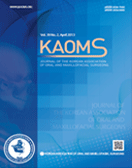Journal of the Korean Association of Oral and Maxillofacial Surgeons
- P-ISSN2234-7550
- E-ISSN2234-5930
- SCOPUS, KCI, ESCI
 ISSN : 2234-7550
ISSN : 2234-7550
Extraction of mandibular third molars: relationship of preoperative anxiety with body mass index, serum high-sensitivity C-reactive protein levels, and visual analog scale scores and predictors of postoperative complications
Yu-Jin Jee (Department of Oral and Maxillofacial Surgery, Kyung Hee University Dental Hospital at Gangdong)
Jaewoong Jung (Department of Oral and Maxillofacial Surgery, Kyung Hee University Dental Hospital at Gangdong)
Mu Hang Lee (Department of Oral and Maxillofacial Surgery, Kyung Hee University Dental Hospital at Gangdong)
Sung ok Hong (Department of Oral and Maxillofacial Surgery, Kyung Hee University Dental Hospital at Gangdong)
Abstract
Objectives: Patients undergoing oral surgery exhibit high anxiety, which may elevate their cortisol levels and affect postoperative recovery. Overweight patients are often encountered in the dental clinic due to the increasing prevalence of overweight. We aimed to investigate the relationships between preoperatively assessed body mass index (BMI), serum cortisol and high-sensitivity C-reactive protein (hs-CRP) levels, and visual analog scale (VAS) scores and preoperative anxiety in patients undergoing mandibular third molar (MM3) extraction and to identify predictors of postoperative complications. Patients and Methods: We analyzed 43 patients (age, 20-42 years) undergoing MM3 extraction. At the first visit, patients completed the Modified Dental Anxiety Scale (MDAS) and Amsterdam Preoperative Anxiety and Information Scale (APAIS) questionnaires. Their BMI and VAS scores were also calculated. The participants underwent blood tests 1 hour before MM3 extraction. On the first postoperative day, the participants’ VAS scores and serum hs-CRP levels were reevaluated. Results: We found that BMI was significantly correlated with preoperative VAS scores. Further, BMI and preoperative hs-CRP levels were significantly correlated among women and patients undergoing extractions of fully impacted MM3s. No correlations were found between serum cortisol and other variables. The preoperative MDAS and VAS scores were significantly positively correlated, especially among patients undergoing extractions of fully impacted MM3s. Multiple linear regression showed that BMI and the eruption status of the MM3 were significant predictors of postoperative hs- CRP levels and VAS scores, respectively. Conclusion: In MM3 removals, patients with higher BMI showed elevated hs-CRP and higher VAS scores before surgery. Patients with higher anxiety among those undergoing extractions of fully impacted MM3s showed higher preoperative VAS scores. The two main predictors of postoperative complications were BMI and MM3 eruption status.
- keywords
- Dental anxiety, Body mass index, High-sensitivity C-reactive protein, Postoperative recovery
- Downloaded
- Viewed
- 0KCI Citations
- 0WOS Citations